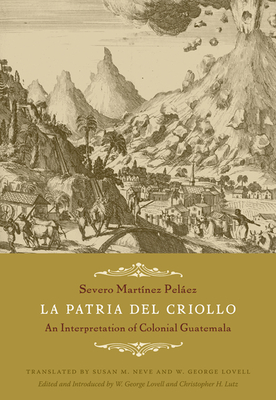La Patria del Criollo: An Interpretation of Colonial Guatemala

La Patria del Criollo: An Interpretation of Colonial Guatemala
Martínez Peláez asserts that "the coffee dictatorships were the full and radical realization of criollo notions of the patria." This patria, or homeland, was one that criollos had wrested from Spaniards in the name of independence and taken control of based on claims of liberal reform. He contends that since labor is needed to make land productive, the exploitation of labor, particularly Indian labor, was a necessary complement to criollo appropriation. His depiction of colonial reality is bleak, and his portrayal of Spanish and criollo behavior toward Indians unrelenting in its emphasis on cruelty and oppression. Martínez Peláez felt that the grim past he documented surfaces each day in an equally grim present, and that confronting the past is a necessary step in any effort to improve Guatemala's woes. An extensive introduction situates La Patria del Criollo in historical context and relates it to contemporary issues and debates.
PRP: 294.01 Lei
Acesta este Pretul Recomandat de Producator. Pretul de vanzare al produsului este afisat mai jos.
264.61Lei
264.61Lei
294.01 LeiLivrare in 2-4 saptamani
Descrierea produsului
Martínez Peláez asserts that "the coffee dictatorships were the full and radical realization of criollo notions of the patria." This patria, or homeland, was one that criollos had wrested from Spaniards in the name of independence and taken control of based on claims of liberal reform. He contends that since labor is needed to make land productive, the exploitation of labor, particularly Indian labor, was a necessary complement to criollo appropriation. His depiction of colonial reality is bleak, and his portrayal of Spanish and criollo behavior toward Indians unrelenting in its emphasis on cruelty and oppression. Martínez Peláez felt that the grim past he documented surfaces each day in an equally grim present, and that confronting the past is a necessary step in any effort to improve Guatemala's woes. An extensive introduction situates La Patria del Criollo in historical context and relates it to contemporary issues and debates.
Detaliile produsului









